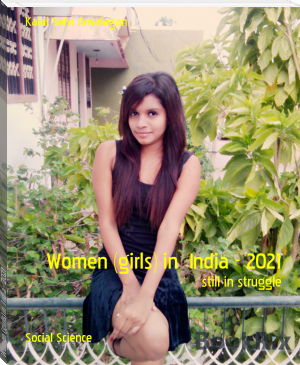India Beyond Stampede Of Stupidities by Santosh Jha (funny books to read .TXT) 📕

Read free book «India Beyond Stampede Of Stupidities by Santosh Jha (funny books to read .TXT) 📕» - read online or download for free at americanlibrarybooks.com
- Author: Santosh Jha
Read book online «India Beyond Stampede Of Stupidities by Santosh Jha (funny books to read .TXT) 📕». Author - Santosh Jha
The first major stupidity is the idea of ‘common man’. The generalization of the label called common man is a major issue as this creates a picture of a reality, which is conveniently virtual, having little grains of realism. Moreover, this label has been used for the convenience and utility of political players, not the people. Election time is the golden period for average voters, the so-called common man. Everyone is out to pamper the voter and as this pampering goes on, the first stupidity is coined.
The perception is made out that the common man is a victim of political and administrative corruption and everywhere, this common man and voter is in deep agony and crisis. The template, which emerges is, there is a fixed idea and a variable idea. The fixed idea is that common man or voter is a good honest person and he knows what is good and what is not good for the country. Part of this fixed idea is that voter is a victim and everyone else are villains, responsible for his plight. The variable idea is, the opposition says, the ruling party is villain and responsible for plight of common man. The ruling party defends that it did most for common man and only it can do more and more better things for him.
This is cyclic as an opposition party may later or somewhere in states becomes the ruling entity and the current ruling outfit may land up in opposition but the accusations shall remain the same, as the slogans are inter-changeable. The activists say, both are fooling the common man as they are two faces of the same coin; meaning, they both are villains. The activists are out to make the common man believe that they alone can make common man happy and well. Both ideas, fixed and variable are stupidities and hypocrisy at its best.
Let us first take the first stupidity of the fixed idea of the good, honest and ‘know-all’ common man, which everyone in the political community is projecting and promoting to suit their interest. There is a philosophical hypothesis on which the empire of hypocrisies of politics, economics as well as culture presides and thrives. The hypothesis is –
“A human being is born rational and is equipped with an innate general will. Therefore, it intrinsically knows what is good for him and what is bad. The wearer knows where the shoe pinches and if he does not know it, nobody else has the business to tell him where it hurts him.”
This hypothesis, especially the more populist shade of the hypothesis, on which democracy and societies work has no scientific and objective basis and that is why, both societies as well as people are troubled and socio-economic and political systems are flawed. The sad realism is; often, an average person seldom knows what is actually good and bad for him or her, in the long run. Also, few know and realize that what is good for him or her, may not be equally good for the society and nation. This missing realization is the sad premise of all populism.
Therefore, cigarettes, liquors and tobacco products are sold with impunity as the responsibility of health and wellness is with so-called rational common man with so-called inborn general will. Similarly, democracy comes with a hypothesis that common man knows what is good for him and therefore, he shall act responsibly and intelligently while making his choices. Everyone knows, how many people, the common men and women pose themselves intelligently and responsibly towards intoxicants and democracy!
The fact remains that a nation’s population has men and women in broadly eight different consciousnesses and each one is antagonistically disposed towards other. The millions of people, comprising the singular notion or label of ‘common man’ or average voter are divided in mutually conflicting socio-economic and cultural identities too, apart from being in different shades of consciousnesses. Within this singular label of ‘common man’, there are groups of people who are also corrupt, oppressors and inimical to others, in the same label. Unlike the populist hypothesis, the common man label is not a homogenous identity and certainly not singularly intelligent and responsible.
It is political convenience and a populist hypocrisy to say and believe that all poor are one common label. It is not. Within one common label of ‘poor’, ‘downtrodden’ or ‘rich’, there are individuals as well as groups, who battle with each other. Precedents prove that intra-class conflicts and clashes are no less than inter-class conflicts. In all societies, across the globe, population of a country is a mix of intelligent and stupid and for sure, most of them have little idea and inclination to understand and accept how democracy and its important institutions work.
In India, majority of people, even in urban and well off population pockets, have little knowledge about the Constitution of India, the system of governance and their expected duties towards democratic institutions. Majority of people do not know what a federal mechanism is and how Indian federal system faces major challenges. Majority of people, even well educated youth and higher income group people do not understand the parliamentary form of democracy and separation and balance of power between executive, legislative and judicial wings of government. Vast majority of people are foolishly unaware of the mechanism, structures and functions of public administration in India. Sadly, the core idea and true spirit of governance is a rocket science for most people either in common man nomenclature or in elite label.
As a result, even when they vote for electing a member of parliament, the average voter believes that a good candidate is one who gets roads repaired and sewerages clean. The issues of national elections, state elections, local body elections all get muddled up. They cannot accept that an ideal member of parliament is one who has abilities, experiences and personality orientation to become a good lawmaker, who has a vision for larger issues of nation’s welfare. Thankfully, no one asked Jawahar Lal Nehru, the first Prime Minister of India, to get roads repaired and streets cleaned in his constituency, as he would then never have won an election!
Globally, it is now believed that elections in India are now free and fair. Still, every time nation goes to polls, large number of tainted and corrupt people get elected. Can the common man label not be blamed for it. Should only politics be blamed for it. In this case, people say, what people can do? There should be law, which could debar such people from contesting. When there shall not be anyone with dubious and wrong credentials, the people shall automatically elect right persons. This populism is always lapped up, as it suits the masses, making the onus shift away from them. However, if this is accepted, why tobacco and liquor are not banned? If people cannot be made responsible for not electing a wrong person, how can they be relied on that they shall use intoxicants rationally? This hypocrisy is the basis of most populisms. Globally, it is accepted that any government, which shall completely ban tobacco and liquor, shall fall the next day. Many governments in developed nations are even legalizing some popular intoxicants, believing, people have the rationality and will to discern what is good and what is bad for them. This hypocrisy suits all. Though, this golden trait can be there in many people, this cannot be accepted that average people or everyone in this label of common man is such discerning.
Globally, tobacco and liquor are not ‘debarred’ because then it is said, ‘average adult are rational and they can effectively use their discretion’. Why then the voters not blamed for not using their discretion and rationality, when it comes to not electing a corrupt and criminally inclined politician? It is a sad reality but fact remains that tobacco and liquor are killers still, many find utility and satisfaction in them. Many find the same in drugs too. Similarly, tainted and criminally inclined legislators and parliamentarians are killers of democracy still, huge number of people find utility and satisfaction in them as they are either ‘good’ for particular ethnic group of people or their own voters.
The fact remains that, in many parts of India, especially in non-urban areas, voters willingly elect a strongman with dubious record, as this man happens to help them in their personal matters. This man gives them money and protection and stands for them in their need. This man may be the worst candidate for the position of being a parliamentarian but he is there for people’s personal needs. Importantly, if this man has some criminal cases against him, it becomes his extra qualification as he is safely labeled as ‘powerfully endowed’ politician.
Only few decades back, in some trades like transport, petrol pump business, cinema halls, hotels, bars, private security and many other trades, those men would be given priority in recruitments who had criminal cases against them. If they were accused of murder, they would get extra salaries. Suitability is natural to all professions. Even in modern world, this ‘preference’ for strongmen exists. Politics cannot be exclusively blamed for it. Everyone does this and adds to the hypocrisy by accusing others for doing it. Even today, most private companies would prefer young guys with no family or those, who are less sentimental about their family needs, even when their recruitment policy shall talk of high idealisms. Even big companies discourage young women, who want to get married and start family. This of course is unofficial.
It is easy to understand how personal benefits usually stand above general morality and social good. In large parts of India, still when a father of a girl goes to look for a groom, the father of the groom convinces him that his son is in secure government service and has a very peaceful and leisurely life because there is little work in government jobs. His salary may not be very high but he has more than enough ‘extra’ income from his job position as he has good political connections and always gets ‘good’ and lucrative postings. The father of the bride is very happy that his daughter shall be in a good life situation with such a man. His would be son-in-law may be corrupt and non-professional official, but he is happy that he earns well and can give good life to his daughter. Most people happily extend priority to personal utility and satisfaction over societal and national good. This corruption of mind and attitude is global and India cannot be blamed for its high incidence. This is however, purely a socio-cultural issue, not an exclusively political one.
The common man may not be entirely blamed for this but the realism is, the average person in this label of common man is a bigger opportunist than anyone else, be it politician, bureaucrat, activist or corporate. It is different thing that this opportunism may be justified or forgiven on the plea that life of a common man is very tough and he has to resort to opportunism and some retail debauchery for his bare survival.
The fact remains that, more powerful and endowed a person, more insecure he is about his survival. A politician has larger and deeper questions of survival, as his career is short, susceptible to whims and fancy of voters. He may claim more justification and compassion towards his opportunism. Everyone does it. There are so many wrongs and ills taking place everywhere and the doer always justifies it on some pretext. There shall always be loads of people who would show compassion towards rapists, blaming women for it, in some way or other. It is a great artistry of populism that most people





Comments (0)